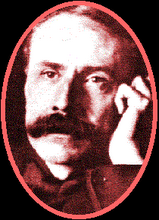 With some help from Science Daily.
With some help from Science Daily.An interesting piece of research by staff at the
Joel Pearson a research associate at the University’s Psychology Department explains:
"We found that mental imagery leads to a short-term memory trace that can bias future perception. This is the first research to definitively show that imagining something changes vision both while you are imagining it and later on."
"These findings are important because they suggest a potential mechanism by which top-down expectations or recollections of previous experiences might shape perception itself”.
To test how imagery affects perception, Pearson, along with co-authors of the study Frank Tong and Colin Clifford had subjects imagine simple patterns of vertical or horizontal stripes. They then presented a green horizontal grated pattern to one eye and a red vertical grated pattern to the other to induce what is called binocular rivalry. During binocular rivalry, an individual will often alternately perceive each stimulus, with the images appearing to switch back and forth before their eyes. The subjects generally reported they had seen the image they had been imagining, proving the researcher's hypothesis that imagery would influence the binocular rivalry battle.
Stronger shifts in perception were found if subjects either viewed or imagined a particular pattern for longer periods of time. They found that both imagery and perception can lead to a build-up of a "perceptual trace" that influences subsequent perception.
Pearson, Clifford and Tong also discovered that changing the orientation of the image from what had been imagined greatly reduced the impact of imagery on perception. Because orientation is processed in early visual areas, this suggests that imagery's interaction with perception may occur at early stages of visual processing.
It is though that these findings may offer an objective tool to assess the concept of imagination.
"It has been very hard to pin down in the laboratory what exactly someone is experiencing when it comes to imagery, because it is so subjective," Tong says. "We found that the imagery effect, while found in all of our subjects, could differ a lot in strength across subjects. So this might give us a metric to measure the strength of mental imagery in individuals and how that imagery may influence perception".
The findings may also suggest that mental imagery is a visual function of the brain and is processed the same an image of a real object.
"More recently, with advances in human brain imaging, we now know that when you imagine something parts of the visual brain do light up and you see activity there," Pearson says. "So there's more and more evidence suggesting that there is a huge overlap between mental imagery and seeing the same thing. Our work shows that not only are imagery and vision related, but imagery directly influences what we see."
This also seems to beg the question as to how the content of your minds eye spills into ‘reality’.
Now in dark brooding moments I have often pictured the rather dramatic effects of my becoming God Emperor of the galaxy. Which I admit is rather a long shot to be honest. But I now have to question how this idle daydreaming may impact on my ability to manage staff at work. I haven’t as yet condescendingly batted away a question on a simple aspect of contract law with a response about not bothering me with such trifles as snuffing out the feeble light that is Betelgeuse remains the primary objective.
But I fear that it is only a matter of time.














4 comments:
Well, this seems perfectly obvious, to my way of thinking.
This is why we call things 'thought experiments'.
Becaue what we actualy do, is consciously evaluate our perspective, then shift it.
I've found that considering a number of totally imaginary situations has enabled me to view something completely differently.
And you can't go back of course, to your previous unenlightened state.
It's ineresting you mention your God-Emperor idea. Because the novel that I never seem to get round to finishing, is based around that idea, that of an actual God-Emperor and it's implications. Kind if like a thought experiment into the possibilities of human evolution and whether we can ever escape the need to great Silverback apes to bow down to and worship.
But sometimes I wonder if I'm actually writing it because I want it published, or whether I just use the drafting of it as a vehicle for my own analysis of the some of the negative possibilities of futurology.
One chapter I kind of had in minddeals with the actual realities of what such an individuals life woul entail, and actualy they would be great dark, basically a human being with a galactic internet perpetually plugged into their head who's body was continually controlled by a computer pumping chemicals in him to regulate his system and keep him at all times, pretty much, a human computer.
Because in a certain sense, I do see this is perhaps the kind of life that maybe, in the future those we entrust to hold executive functions, may well have to live.
But naturally, how you tackle anything, is a product of every thought that's gone before. No thought exists in solation.
Fascinating as this may sound I'm going to file it in the "no shit Sherlock" folder. Do they still give grants for this kind of thing?
Yes, you dreamed it, Grendel.
Grants? Do I hear 'Grants'?
...
*Runs off skipping hoping to find one*
Post a Comment